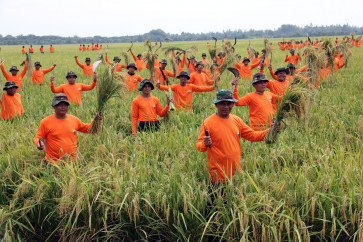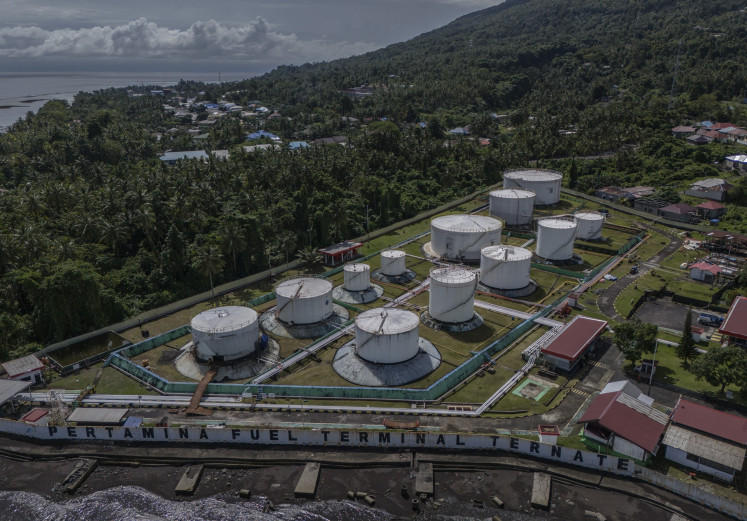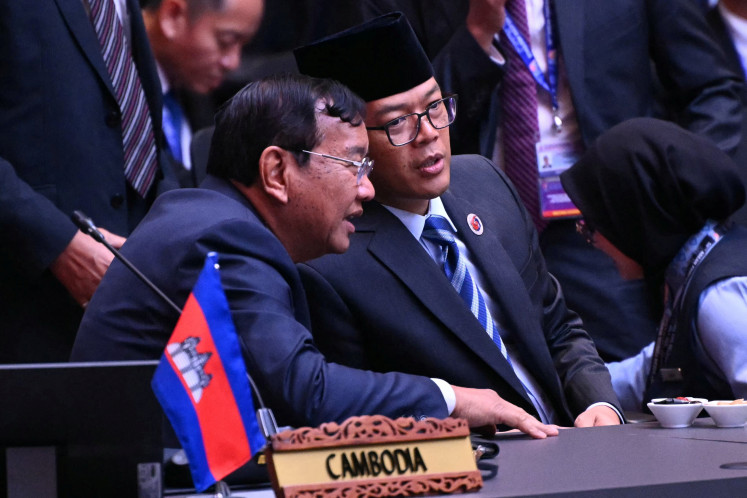Popular Reads
Top Results
Can't find what you're looking for?
View all search resultsPopular Reads
Top Results
Can't find what you're looking for?
View all search resultsStandarization of Islamic industry sought
Economic brotherhood: Indonesian President Susilo Bambang Yudhoyono (center with black cap) joins other Islamic leaders at the opening of the fifth World Islamic Economic Forum (WIEF) in Jakarta on Monday
Change text size
Gift Premium Articles
to Anyone
Economic brotherhood: Indonesian President Susilo Bambang Yudhoyono (center with black cap) joins other Islamic leaders at the opening of the fifth World Islamic Economic Forum (WIEF) in Jakarta on Monday. The other leaders are (from left to right) WIEF chairman Tun Musa Hitam, United Arab Emirates Crown Prince Sheik Saud bin Saqr Al Qasimi, Moroccan Prime Minister Abbas El Fassi, (Yudhoyono), Malaysian Prime Minister Abdullah Ahmad Badawi, Qatar Deputy Prime Minister Abdullah Bin Hamad Al Attiyah, Organization of Islamic (OIC) Secretary-General Ekmeleddin Ihsanoglu and the fifth WIEF organizing committee chairman Sofyan Djalil. JP/R. Berto Wedhatama
As the Fifth World Islamic Economic Forum (WIEF) officially opened Monday, participating nations geared up to promote their lagging Islamic finance system amid the ongoing crisis in the “conventional” system.
Malaysia Prime Minister Abdullah Ahmad Badawi said as the conventional financing system continued to collapse, having a serious impact on the global economy, it was high time for the Muslim world to turn the “adversity into an opportunity”.
“The world is beginning to appreciate the need for alternative arrangements to the current international financial system. At the same time, Islamic finance is gaining credibility as an alternative,” he said.
Badawi said he believed Islamic finance had a bright future but that banking and finance standards needing harmonizing and Islamic financial products really required greater innovation.
“As long as our markets remain divided by different jurisdictions and interpretations of sharia standards, Islamic finance is unlikely ever to grow beyond the shore of Muslim countries.
He said the Islamic Development Bank (IDB) could play a pivotal role in attracting young and bright practitioners to develop the Islamic finance industry.
Indonesia, as the most populated Muslim country in the world, will play a major role in developing Islamic finance, President Susilo Bambang Yudhoyono said.
“Islamic banking should now be able to take a leading position in the banking world. Islamic banks have been much less affected by the financial meltdown than conventional banks — for the obvious reason that sharia banks do not indulge in investing toxic assets and leveraged funds. They are geared to supporting the real economy,” said Yudhoyono.
He however stopped short of mentioning concrete efforts the country would take to bolster the development of Islamic finance.
In moves to boost trade within the participating nations, four memorandums of agreement (MoA) worth more than US$3 billion were signed at the WIEF.
The country’s Islamic financing industry remains relatively small compared to the overall financing industry, but having last year enacted the Islamic Financing and Islamic Bond Laws, the government is upbeat about the industry outlook.
The amount of financing provided by the country’s Islamic banking institutions has grown from a mere Rp 5.5 trillion ($458 million) in 2003 to Rp 28 trillion in 2007 and Rp 38.2 trillion in 2008, despite the 2008 figure constituting less than 3 percent of the total national bank financing.










